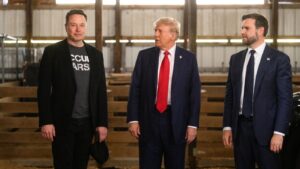
Speaker of the House Mike Johnson, R-La., left, and Senate Majority Leader John Thune, R-S.D., speak to reporters the U.S. Capitol on April 10. The Senate hopes to pass legislation in the coming weeks to enact President Trump’s domestic policy priorities — a bill that has already cleared the House.
J. Scott Applewhite/AP
hide caption
toggle caption
J. Scott Applewhite/AP
The GOP-led Senate is preparing to tackle legislation aimed at advancing President Trump’s domestic policy initiatives. This comes as fiscal conservatives within the party express concerns over the bill’s projected impact on national debt, which could increase by trillions.
In May, the House narrowly approved the “One Big Beautiful Bill Act,” a measure that proposes tax reductions and boosts in border and military expenditures, while also reducing Medicaid spending.
The bill is progressing through Congress via the reconciliation process, allowing Senate Republicans to pass it with a simple majority. Majority Leader John Thune, R-S.D., faces a challenge, as he can afford to lose only three GOP senators to maintain the majority necessary for passage. Several senators have already expressed reservations.
Senator Ron Johnson, R-Wis., labeled the bill “completely unsustainable” during a Fox News appearance and plans a hearing before the full Senate vote. Senator Rand Paul, R-Ky., suggested on CBS News that there is sufficient GOP opposition to mandate changes to the House-approved version.
Concerns Over Deficit
Central to the GOP bill is an extension of Trump’s 2017 tax cuts, including a temporary tax pause on tips and overtime. The Congressional Budget Office estimates that these tax changes could increase the deficit by $3.8 trillion over the next decade.
Criticism of the CBO’s projection has emerged from the White House and some Republican lawmakers. Business leaders like Elon Musk and JP Morgan Chase CEO Jamie Dimon have also voiced concerns. Dimon cautioned that continued government spending could lead to a “crisis” in the bond market.
Senator Johnson echoed Dimon’s sentiment, stating, “It’s completely unsustainable,” and advocating for a return to pre-pandemic spending levels. He also proposed dividing the House bill into two separate Senate bills.
Senator Paul noted that he is not alone in opposing the bill’s deficit implications, claiming, “I think there are four of us at this point.”
Former President Trump has warned via social media that Kentucky voters would not forgive Senator Paul if he votes against the bill.
Paul has criticized the bill’s provision to raise the U.S. debt limit by $4 trillion, a move Treasury Secretary Scott Bessent claims is crucial to avoid a financial crisis.
Bessent reassured on CBS’ Face the Nation that the deficit would decrease over time, stating, “The deficit this year is going to be lower than the deficit last year, and in two years it will be lower again. We are going to bring the deficit down slowly.”
Medicaid Spending Cuts
The House bill aims to reduce Medicaid spending by implementing work requirements, shortening the enrollment period, and eliminating inefficiencies.
A CBO analysis of similar work requirements suggested federal savings but anticipated no change in employment, with state costs potentially rising.
Medicaid changes have been divisive among Republicans. In May, Senator Josh Hawley, R-Mo., wrote in The New York Times that substantial Medicaid cuts are “both morally wrong and politically suicidal.” However, he later stated that work requirements should not be considered cuts.
At a recent Iowa town hall, Senator Joni Ernst defended the House bill’s Medicaid changes, asserting that ineligible recipients would be removed from the program. Her response to a heckler’s comment went viral, drawing criticism from Democrats.
Potential Amendments and Legislation Risks
Some provisions in the GOP bill might be vulnerable to changes due to the Byrd Rule, which eliminates non-budgetary elements in reconciliation bills. Measures related to AI, judicial power, gun regulation, and Planned Parenthood could be affected.
If the Senate modifies the legislation, it will return to the House for final approval. Republicans aim to present the finalized bill to President Trump by July 4.







Be First to Comment